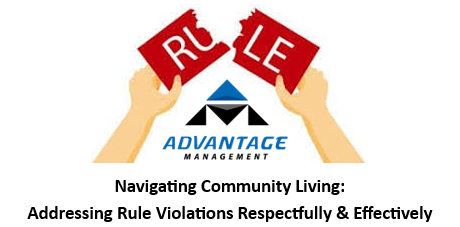Living in a community offers numerous advantages, from shared amenities and reduced expenses to the unique appeal of diverse housing options. These benefits thrive when all residents contribute to a respectful and cooperative environment. This means understanding and adhering to the community’s governing documents and the rules and responsibilities that ensure harmonious living for everyone. We strongly encourage all homeowners, tenants, and occupants to familiarize themselves with these documents, which are typically available on our website or at the management office.
While we hope every owner will easily comply with every rule and regulation, that isn’t always the case. So, what steps should you take if you notice a potential rule infraction?
Is It a Real Issue, or Just Part of Community Living?
The first crucial step is to pause and consider: Is this truly a violation that significantly impacts the community, or is it simply a minor inconvenience inherent to shared living? For instance, while a loud party at 2 AM is a clear violation, the occasional sounds of children playing are generally part of community life.
Taking Action: From Neighborly Chat to Formal Complaint
If you determine the issue is a genuine violation, we encourage residents to first consider a friendly, neighborly conversation to resolve minor matters directly, if you feel comfortable doing so. Often, a neighbor may simply be unaware they are causing an issue.
However, if direct communication isn’t feasible or doesn’t resolve the issue, it’s time to inform the property manager. When contacting the property manager, please be as specific as possible. Include relevant dates, times, photographs, or video if necessary, and cite the specific rule(s) you believe are being violated. This detailed information is crucial for an effective investigation.
The Violation Process: From Notice to Hearing
Upon receiving your detailed report, the property manager will typically issue a formal notice of violation to the unit in question. This serves to inform the owner of the potential infraction, as they may not be aware they are in violation of a specific rule. Please note that the initial notice of violation sent to the owner maintains the anonymity of the complaining party.
If the situation continues, it is always best to keep a log of dates and times when the infraction is occurring. This record can become vital evidence if a hearing is ever needed.
If the first letter doesn’t solve the issue, please contact your manager again and share your log and any other evidence you might have. The property manager will then send a second letter, but this time, there could be a fine associated with the continued issue. When a fine is issued, the homeowner being fined is entitled to a hearing to contest the fine. The owner would need to formally request this hearing. If the owner does not contest the hearing, then the fine will stand and be added to their account.
The Hearing Process: Anonymity Ends
It’s important to understand that if a formal hearing becomes necessary, the complaining party would no longer remain anonymous and would be required to attend the hearing as a witness to present their observations and evidence. A hearing is usually held in executive session after a board meeting. Declining to attend a hearing may result in the Board choosing to remove any associated fines due to insufficient evidence.
When to Involve the Authorities
Always remember that there are certain things an association and its board can enforce. However, when things are truly out of hand, you should not hesitate to involve the Police. This is especially true when an issue isn’t just an association rule violation, but has escalated into a nuisance or potentially violates city laws. The Police have the ability to shut things down quicker than the association.
Responsibilities of Landlords
For those of you who own a unit but lease it out, you are still responsible for your unit and the actions of your tenants. It is very important as a landlord that you share the rules and regulations with your tenant. While you may not be the one committing the issues, you are still responsible for any fines that may be added to your account.
Embracing Community Life
There is case law in Illinois that talks about issues where there are certain annoyances one must endure in a multiple dwelling building. This should be kept in mind when filing a complaint. There will be times when both parties might not be happy or satisfied with the results, but it is part of living in a community. By understanding and respecting our shared guidelines, we can all contribute to a more pleasant and harmonious living environment.


Recent Comments